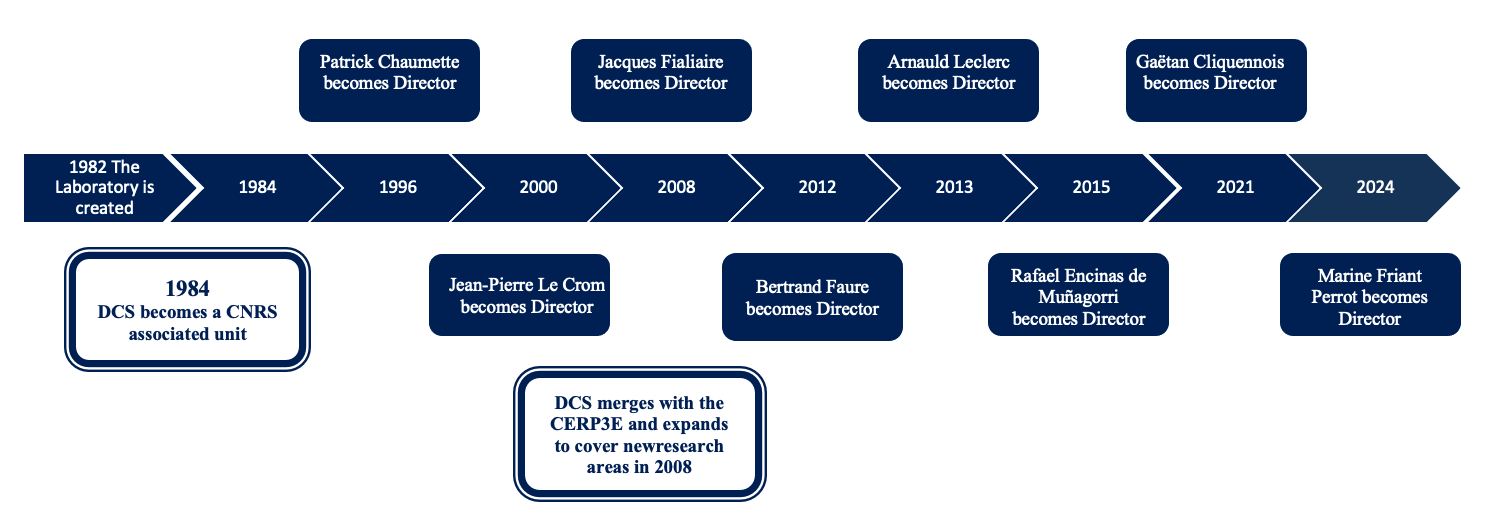Laboratory history


The DCS Laboratory was founded by Michèle Bordeaux, as a “recommended team” by the Directorate of Academic Research and became a CNRS Associated Unit in 1984 (UA CNRS 1154).
The DCS Laboratory was originally divided into two parts:
- The History and Social Law Laboratory, comprising the History and Social Protection Team (directed by Philippe-Jean Hesse) and the Social Law Team (directed by Alain Supiot).
- The Political Research Centre, which includes the Women, Law and Social Change team (directed by Michèle Bordeaux), the Law and Changes in Agricultural Production Methods team (directed by Louis Lorvellec), the Criminal and Penal Record-Keeping team, and the Electorates team.
The laboratory was subsequently directed by Patrick Chaumette (ESA CNRS 6028) and then by Jean-Pierre Le Crom (UMR CNRS 6028).
Since being recognised by the CNRS as a research unit in 1984, The DCS Laboratory has developed around a critical approach to law that refuses to submit to the traditional boundaries between public and private law, between an internal perspective (legal research) and an external perspective (research about laws), with a focus on social law, rural law and criminal-law policy. It was not long before the laboratory was recognised and funded by the CNRS, thereby obtaining the status of a Joint Research Unit.
In 2008, The DCS Laboratory (UMR CNRS 6028) expanded when it merged with a team of public-law researchers: the Research Centre for Public Regulations on Spaces, the Economy and the Environment (CERP3E, UMR CNRS 6225). Since then, The DCS Laboratory has expanded to cover new research areas, including environmental law, inheritance law and regional government law.
The reconstituted unit (formerly UMR CNRS 3128, today UMR CNRS 6297) decided to retain the name The Law and Social Change (DCS) Laboratory and was headed by Jacques Fialaire until 2012, followed by Bertrand Faure (September 2012 to October 2013), Arnauld Leclerc (October 2013 to June 2015), Rafael Encinas de Muñagorri (since June 2015 to 2021), Gaëtan Cliquennois (2021 to February 2024) and today by Marine Friant Perrot.
DCS is a CNRS Mixed Research Unit (UMR), predominantly in the legal field, designed to develop interdisciplinary relationships.
The common core of the laboratory lies in its overall objective: to understand the role of laws and judgments in effecting changes in contemporary society. Emphasis is given to the observation of practices and to approaches to evaluate the effectiveness of the legal standard. The objectives monitored are measured against the concepts of inter- and intra-disciplinarity. Based on this, the laboratory offers research support to thirteen Master 2 specialties
Various forms of support are provided for research activities, including: the promotion of research (support for symposia, help for publications, etc.), scientific and technical information, including the publication of a biannual newsletter, and access to training. In recent years, The DCS Laboratory has seen a significant increase in its international activities and tand its researchers have joined many international research networks.


